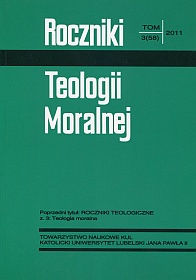Człowiek i moralność w postmodernistycznym świecie
Abstrakt
Contemporary culture is characterized by a variety of definitions of man. This indicates, on the one hand, the multidimensional and multifaceted character of the truth about man, and on the other, leads to quite considerable confusion in the answer to the question: who is man? It seems that the basic perspective for presenting the situation, in which contemporary man has found himself is determined by postmodernism and the life style it offers. Although the question of postmodernism does not exhaust all the complex range of important problems of the modern world, one has to realize that its ideas – especially now, in the era of electronic communications – have spread and are present in all the world, assuming a more and more global character.
In the postmodernist world the integral vision of man is often substituted by partial definitions that reduce man to “something” inside man. The occurring changes assume such dramatic forms that they are defined as “anthropological catastrophe”. The so-called new cultural model of man who takes a radically new attitude towards himself, toward another man, and ultimately also towards God appears from them. Postmodernism questions subjectivity and transcendence of the human person, whereby it contributes to destruction of morality. This current, destroying proper relations between freedom and truth in man, is situated in the area of modern forms of the basic anthropological error.
Bibliografia
Bauman Z.: Dwa szkice o moralności ponowoczesnej. Warszawa: Instytut Kultury 1994.
Bauman Z.: Wolność. Tł. J. Tokarska-Bakir. Kraków: Wydawnictwo Znak; Warszawa: Fundacja im. Stefana Batorego 1995.
Bortkiewicz P.: Postmodernistyczna destrukcja kultury moralnej. W: Postmodernizm – wyzwanie dla chrześcijaństwa. Red. Z. Sareło. Poznań: Pallottinum 1995 s. 28-39.
Bortkiewicz P.: Metodologiczne problemy antropologii teologicznomoralnej. W: Antropologia teologicznomoralna. Koncepcje – kontrowersje – inspiracje. Red. I. Mroczkowski, J. Sobkowiak. Warszawa: Wydawnictwo UKSW 2008 s. 97-114.
Bramorski J.: Postmodernizm jako wyzwanie dla moralności chrześcijańskiej. CT 72:2002 nr 3 s. 73-90.
Bramorski J.: Wyzwalająca moc pokuty chrześcijańskiej. Studium teologicznomoralne. Pelplin: Wydawnictwo Diecezji Pelplińskiej „Bernardinum” 2004.
Bronk A.: Krajobraz postmodernistyczny. „Ethos” 9:1996 nr 1-2 s. 79-100.
Grzegorczyk A.: Postmodernizm przeciwko prawdzie. „Ethos” 9:1996 nr1-2 s. 150-168.
Frossard A.: „Nie lękajcie się”. Rozmowy z Janem Pawłem II. Tł. A. Turowicz. Watykan: Libreria Editrice Vaticana 1982.
Mroczkowski I.: Kondycja moralna człowieka ponowoczesnego. RT 48:2001 z. 3 s. 21-34.
Nowosad S.: Prawda człowieka – prawda jego działania. W: Antropologia teologicznomoralna s. 57-82.
Sareło Z.: Postmodernistyczny styl myślenia i życia. W: Postmodernizm – wyzwanie dla chrześcijaństwa s. 9-27.
Sareło Z.: Postmodernizm w pigułce. Poznań: Pallottinum 1998.
Styczeń T.: Wolność z prawdy żyje. Wokół encykliki „Veritatis splendor”. W: JanPaweł II. Veritatis splendor. Tekst i komentarze. Red. A. Szostek. Lublin: RW KUL 1995 s. 127-168.
Szahaj A.: Co to jest postmodernizm? „Ethos” 9:1996 nr 1-2 s. 63-78.
Wielgus S.: Postmodernizm jako współczesne wyzwanie wobec podstaw kultury euroatlantyckiej i chrystianizmu. W: „Tertio millennio adveniente”. U progu trzeciego tysiąclecia. Red. G. Witaszek. Lublin: RW KUL 2000 s. 339-354.
Życiński J.: Wyzwania duszpasterskie w kulturze postmoderny. „Więź” 45:2002 nr 1 s. 13-25.

